英语能力竞赛nepcs高一年级组样题
2012_年全国中学生英语能力竞赛(NEPCS)初赛高一年级组试题标准答案及评分标准
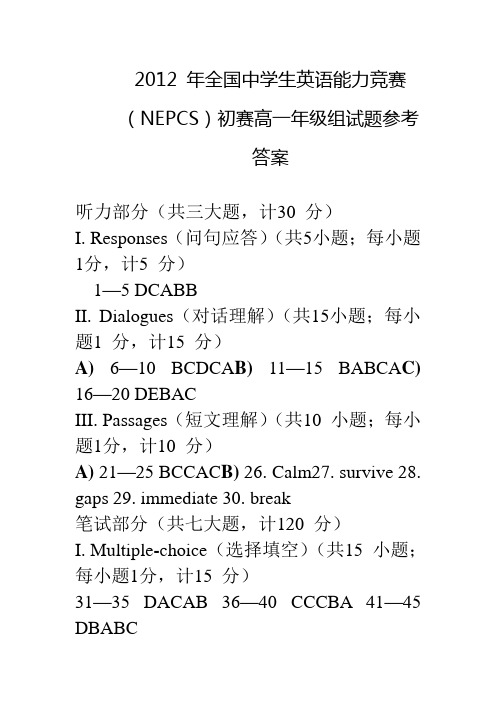
2012 年全国中学生英语能力竞赛(NEPCS)初赛高一年级组试题参考答案听力部分(共三大题,计30 分)I. Responses(问句应答)(共5小题;每小题1分,计5 分)1—5 DCABBII. Dialogues(对话理解)(共15小题;每小题1 分,计15 分)A)6—10 BCDCA B)11—15 BABCA C) 16—20 DEBACIII. Passages(短文理解)(共10 小题;每小题1分,计10 分)A) 21—25 BCCAC B) 26. Calm27. survive 28. gaps 29. immediate 30. break笔试部分(共七大题,计120 分)I. Multiple-choice(选择填空)(共15 小题;每小题1分,计15 分)31—35 DACAB 36—40 CCCBA 41—45 DBABCII. Cloze(完形填空)(共14 小题;每小题1分,计14 分)A) 46—51 CDCACC52. fifth 53. which 54. called 55. government56. underneath /under57. were 58. Britain 59. throughIII. Reading comprehension(阅读理解)(共18 小题;每小题2分,计36 分)A) 60. D 61. C 62. F 63. F64. She has studied there for 5 years.65. She doesn't have to live at the school. /She can share a flat with her friends.B) 66. considered 67. moved 68. reasons 69. escape 70. influenced 71. interestingC) 72—77 EGAFBCIV. Translation(翻译)(共5 小题;每小题2 分,计10 分)A) 78. 只有摆事实,讲道理才能使人信服。
英语能力竞赛NEPCS初赛高一英语试卷 试题

2021年下学期全国中学生英语才能竞赛(NEPCS)初赛高一英语试卷听力局部〔一共三大题,计30分〕I. 句子理解〔Sentences〕〔一共10小题,计10分〕请听句子,然后从A、B、C、D四个选项里面选出一个与你所听到的句子意思一致或者相近之答案。
每个句子只读一遍。
〔答案涂在答题纸上〕1. A. You mustn't bring mobile phones into this meeting room.B. Don't leave your mobile phones in this meeting room.C. Mobile phones cannot be used in this meeting room.D. You can use mobile phones in this meeting room.2. A. You'd better leave because the light isn't bright enough to work.B. You must check that the light is turned off when you leave.C. When you leave, the light should remain on.D. Please take the lamp with you when you leave.3. A. Emma seldom speaks no matter whether she's excited or not.B. Emma is so excited that she can't say a word.C. Emma won't say a word unless she's excited.D. Emma is too excited, and she talks a lot.5. A. Ellen always goes to school after a short walk.B. Ellen seldom goes out for a walk before going to school.C. Ellen likes to go to the school yard for a short walk.D. Ellen often goes out for a short walk after she gets to school.6. A. Jerry is fond of playing with his little brother.B. Jerry is very happy to meet his little brother by accident.C. Jerry loves to read funny stories for his little brother.D. Jerry is very happy to go without his little brother who always bothers him.7. A. I stood up because I saw your mother was coming.B. I wanted to talk with your mother face to face.C. I haven't gone to sleep, because I wanted to talk about your mother with you.D. I didn't want to talk with you about your mother at all.9. A. We should stay with our friends and our family and go nowhere.B. Our friends and our family will always stay far away from us.C. We should keep in touch with our friends and relatives wherever we go.D. We should enjoy our leisure to the full by making trips to other countries on holiday.10. A. I want to know whom Jane will invite to her birthday party.B. I wonder what the people whom Jane is going to invite to her birthday party do.C. Jane is going to invite nobody else but me to her birthday party.D. Jane is going to give notice to people that she will put off her birthday party to next Sunday.II. 对话理解〔Dialogues〕〔一共10小题,计10分〕A〕请听下面五组小对话,每组对话后有一个问题,然后根据你所听到的对话内容,选择能答复所提问题的最正确答案。
2008年全国中学生英语能力竞赛(NEPCS)决赛高一年级组试题附答案
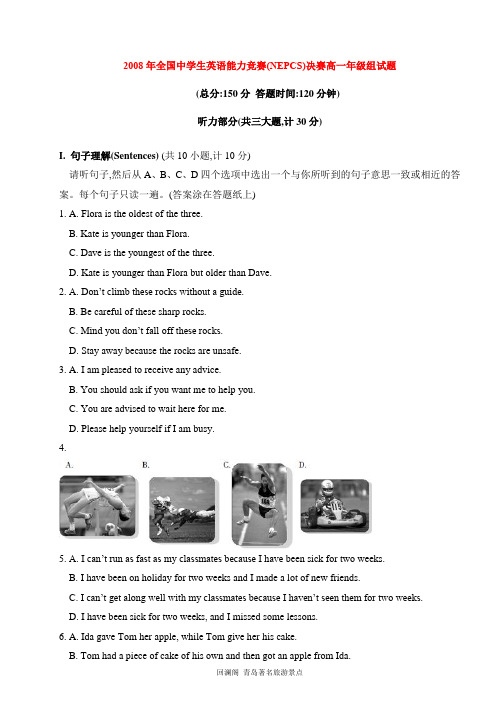
2008年全国中学生英语能力竞赛(NEPCS)决赛高一年级组试题(总分:150分答题时间:120分钟)听力部分(共三大题,计30分)I. 句子理解(Sentences) (共10小题,计10分)请听句子,然后从A、B、C、D四个选项中选出一个与你所听到的句子意思一致或相近的答案。
每个句子只读一遍。
(答案涂在答题纸上)1. A. Flora is the oldest of the three.B. Kate is younger than Flora.C. Dave is the youngest of the three.D. Kate is younger than Flora but older than Dave.2. A. Don’t climb these rocks without a guide.B. Be careful of these sharp rocks.C. Mind you don’t fall off these rocks.D. Stay away because the rocks are unsafe.3. A. I am pleased to receive any advice.B. You should ask if you want me to help you.C. You are advised to wait here for me.D. Please help yourself if I am busy.4.5. A. I can’t run as fast as my classmates because I have been sick for two weeks.B. I have been on holiday for two weeks and I made a lot of new friends.C. I can’t get along well with my classmates because I haven’t seen them for two weeks.D. I have been sick for two weeks, and I missed some lessons.6. A. Ida gave Tom her apple, while Tom give her his cake.B. Tom had a piece of cake of his own and then got an apple from Ida.C. Ida gave Tom an apple instead of a piece of cake.D. Ida liked apples rather than cakes.7. A. He always makes a long speech.B. He seldom makes a speech.C. He always sits down to make a speech.D. He asks others to stand up when he makes a speech.8. A. There are more women than men in our factory.B. About seventy percent of the workers in our factory are men.C. Less than sixty percent of workers in our factory are men.D. About thirteen percent of the workers in our factory are women.9.10. A. Lisa is welcomed by others because she’s a fashionable girl.B. People don’t like Lisa because s he is selfish.C. People like Lisa because of her friendliness and understanding.D. Lisa is good at painting and dancing.II. 对话理解(Dialogues)(共10小题,计10分)A) 请听下面五组小对话,每组对话后有一个问题,然后根据你所听到的对话内容,选择能回答所提问题的最佳答案。
2013年全国中学生英语能力竞赛(NEPCS)高一组决赛(含答案和听力)

2013年全国中学生英语能力竞赛(NEPCS)决赛高一年级组试题(总分:150分答题时间:120分钟)听力部分(共三大题,记30分)I. Responses (句子应答)(共5小题;每小题1分,记5分)Please listen to the following five sentences and choose the best response to each one you hear. Each sentence will be read only once.(请听句子,然后选出一个能够恰当应答你所听到的句子的最佳选项。
每个句子只读一遍。
)(答案涂在答题纸上)1.A. It’S sunny.B.What a pity.C.I think SO.D.You’d better not.2.A.I think it’s a western.B.I don’t want to watch that.C.The news is at six fifteen.D.I'll meet you at the school gate.3.A.I’11 have dinner with you.B.Give me a call at any time.C.It depends on how busy we are.D.Let’S go to see a film.4.A.Never mind.B.You’re welcome.C.I've no idea.D.That’S wonderful.5.A.Will 2 o'clock this afternoon be OK? B.That’S really amazing.C.I’ll try my best.D.I like Chinese food best.II. Dialogues(对话理解)(共15小题;每小题1分,记15分)A) Please listen to the following five mini-dialogues. Each dialogue is followed by a question. Choose the best answer or picture for each question. Each dialogue and question will be read twice.(请听下面五组对话,每组对话后有一个问题,根据你所听到的对话内容,选择能回答所提问的最佳选项。
2013年全国中学生英语能力竞赛(NEPCS)高一组决赛试题含答案
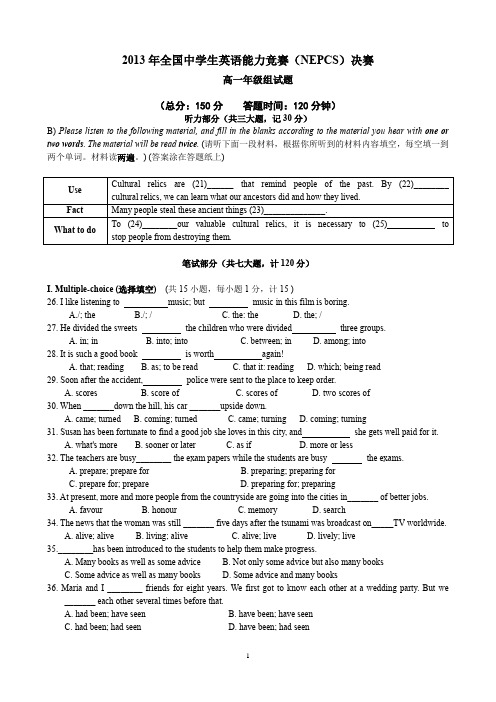
2013年全国中学生英语能力竞赛(NEPCS)决赛高一年级组试题(总分:150分答题时间:120分钟)听力部分(共三大题,记30分)B)Please listen to the following material, and fill in the blanks according to the material youhear with one or two words. The material will be read twice.(请听下面一段材料,根据你所听到的材料内容填空,每空填一到两个单词。
材料读两遍。
) (答案涂在答题纸上)笔试部分(共七大题,计120分)I. Multiple-choice(选择填空)(共15小题,每小题1分,计15 )26. I like listening to music; but music in this film is boring.A./; theB./; /C. the: theD. the; /27. He divided the sweets the children who were divided three groups.A. in; inB. into; intoC. between; inD. among; into28. It is such a good book is worthagain!A. that; readingB. as; to be readC. that it: readingD. which; being read29. Soon after the accident, police were sent to the place to keep order.A. scoresB. score ofC. scores ofD. two scores of30. When _______down the hill, his car _______upside down.A. came; turnedB. coming; turnedC. came; turningD. coming; turning31. Susan has been fortunate to find a good job she loves in this city, and she gets well paid for it.A. what's moreB. sooner or laterC. as ifD. more or less32. The teachers are busy________ the exam papers while the students are busy the exams.A. prepare; prepare forB. preparing; preparing forC. prepare for; prepareD. preparing for; preparing33. At present, more and more people from the countryside are going into the cities in_______ of better jobs.A. favourB. honourC. memoryD. search34. The news that the woman was still _______ five days after the tsunami was broadcast on_____TV worldwide.A. alive; aliveB. living; aliveC. alive; liveD. lively; live35.________has been introduced to the students to help them make progress.A. Many books as well as some adviceB. Not only some advice but also many booksC. Some advice as well as many booksD. Some advice and many books36. Maria and I ________ friends for eight years. We first got to know each other at a wedding party. But we_______ each other several times before that.A. had been; have seenB. have been; have seenC. had been; had seenD. have been; had seen37. I suggested that heto hospital at once, but he insisted that he quite well then.A. was sent; feltB. should be sent; was feelingC. be sent; feelD. should be sent; should feel38. --Did you have a good day at school?--Yeah, I had a great day. I got the part of Juliet in the school play! Can you believe it?--______________ I'll cook your favourite for dinner.A. That's excellent news!B. That's all right.C. Don't be ridiculous!D. Take it easy.39. --Is that really what you're wearing to meet your new boss?-- _______ What'swrong with what I'm wearing?--Well... it's just... Why don't you put on something smarter? You look a bit of a mess.A. What did you say?B. What do you mean?C. You must be kidding.D. Never mind.40. --I've been thinking about quitting this course. It seems it doesn't suit me.--You can't stop trying now. Think of all the time you've invested.--I know, I've thought of that but I don't think I have much choice,A. I'll see you there.B. That's a good idea,C. You can't be serious.D. I'll give it a go.ⅡCloze (完形填空)(A)Most people have trouble admitting theirown faults,though they're more than happy to point out everyoneelse's. This can be (41)_________.After all, it's usually when someone else tells us that we have done something wrong that welearn something about ourselves. What wehave to do is take a deep breath, and face up to what we have done. Remember, when it comesto understanding (42), we're not on our own. Everyone we know lends a helping hand!Of course, doing the wrong thing is easy, but it's what we do about our mistakes that counts.Naturally we are all good at (43) to believe that we have done anything wrong at all.As we try to justify our actions, our (44) get more and more Complicated. We try toconvince the listener that we are telling the truth, but it's of no use. There's no chance at allthat they will believe us. And the truth is that it is ourselves we have deceived ( 蒙骗), not them.That's the very point I'm trying to make. Whatever you do, don't get into the habit of deceivingyourself. What is difficult is (45)______ admitting that we are wrong---especially toourselves.B)A diary is an individual's personal account of his / her daily experiences. Very often, diaries(46) con_____ not just details of what happened on particular days, but also include(47)(observe) and thoughts inspired by the events recorded.It is very likely that many of you have tried to keep a diary at some time or other andequally likely that many of you (48) up. either because keeping it going becametoo much of a chore or because you felt that what you were recording was of little interest.(49) H,others among you may still be keeping a regular account of your activities in a diary form and discovering the value of being able to (50) exyourprivate thoughts and feelings, knowing that they are not intended to be shared with anyone else.Although some people, such as politicians, keep diaries in order to explain and justify their (51)______(contribute) to important events and with the intention that their diarieswill one day be published, not all diaries are (52)(write)for this purpose. Most people keep diaries for precisely (恰恰)the (53) opreason they wantwhat they write to be kept (54) and to be seen bytheir eyes only because they use their diaries as an opportunity to express their most intimate(秘密的) thoughts and feelings about their (55) expand the people they meet.III. Reading Comprehension(阅读理解)(共20小题,56-60每小题1分,61-75每小题2分计35分)AIf you ask someone why he or she wears clothes, the answer will probably be "To keep warm and to cover my body." These are the basic reasons clothes are worn, but people also want to lookattractive and appear successful to others!If people only wore clothes for warmth and to cover their bodies, most clothing would be simple and cheap. In most Western countries, however, clothing is sometimes very expensive. The main reason for this is not the cost of the fabric (布料) or the cost of making the clothes. The clothes are expensive because of fashion.Successful businessmen, for example, often wear very expensive suits, shirts and ties. Sometimes they pay thousands of dollars for a suit and hundreds of dollars for a tie. It's still just a suit and tie but they paythese prices because of the famous name of the designer. A suit costing much less would be just as warm and would cover the wearer's body just as well.Fashion is constantly (不断地) changing, which means that people who want to be fashionable have to buy new clothes every few months, even if last month's clothes have only been worn once or twice. Some people have wardrobes(衣柜) full of clothes that have hardly been worn but are no longer in fashion. Being fashionable, therefore, can be a very expensive pastime!Questions 56-58: Choose the best answer from A, B, C and D according to the passage.56. Why do people wear clothes?A. Only to cover themselves.B. Just to make themselves attractive.C. Just because of fashion.D. For a variety of reasons.57. Successful businessmen buy very expensive suits because of the________.A. cost of the fabricB. famous name of the designerC. cost of making themD. good packages58. According to the passage, fashionable people have to________.A. wear their clothes only onceB. buy new clothes regularlyC. wear last month's clothesD. buy new clothes once or twiceQuestions 59-60: Decide whether the following statements are true (T) or false (F) accordingto the passage.59. Successful businessmen pay thousands of dollars for a tie.60. Some clothes are no longer in fashion though they have hardly been worn.BThere're two main things that make aircraft engineering difficult: the need to make every part as reliable (可靠的) as possible and the need to build everything as light as possible.(61)_____________________ Given a certain power of engine and a certain fuel consumption( 消耗), there is a practical limit to the total weight of the aircraftthat can be made to fly. (62) So the structure of the aircraft has to be assmall and light as safety and efficiency (效能) will allow. The designer must calculate (计算) the normal load (负荷that each part will bear. This specialist is called the "stress man". Hetakes account of any unusual stress that may be put on the part.The stress man's calculations go to the designer of the part, and he must make it as strongas the stress man says is necessary. (63) Each separate part is tested, thena whole assembly (装配) --for example, a complete wing, and finally the whole aeroplane.When a new type of aeroplane is being made.normally only one of the first three made will beflown. Two will be destroyed on the ground in structural tests. (64)______________(65) The first is to find the resistance (阻力) to loading of thewings, tail, etc. until they reach their largestamount of load and collapse (崩溃). The other testis for fatigue ( 疲乏) strength. When a plane has passed all the tests it can get a government certificate (证书) of airworthiness, without which it is illegal to fly, except for test flying.Questions 61-65: Choose from the sentences A-G to complete the passage. There are two extrasentences which you do not need to use.CAuctions(拍卖) are public sales of goods, conducted by an officially approved auctioneer. He asks the crowdassembled in the auction-room to make offers, or "bids", for the various itemson sale. He encourages buyers to bidhigher figures, and finally names the highest bidder as the buyer of the goods. This is called "knocking down" the goods, for the bidding ends when the auctioneer bangs a small hammeron a table at which he stands. The ancient Romans probably invented sales by auction, and the English word comes fromthe Latin "auctio", meaning "increase". The Romans usually sold in this way the spoils (战利品]) taken in war; these sales were called "sub hasta", meaning "under the spear", a spear beingstuck in the ground as a signal for a crowd to gather. In England in the 18th and 19th centuriesgoods were often sold "by the candle": a short candle was lit by the auctioneer, and bids couldbe made while it stayed alight.The auctioneer's services are paid for in the form of a percentage of the price the goodsare sold for. The auctioneer therefore has a direct interest in pushing up the bidding as high aspossible. The auctioneer must know fairly accurately the current market values of the goods heis selling, and he should be acquainted with(了解) regular buyers of such goods. He will alsoplay on the rivalries (竞争)among his buyers and succeed in getting a high price byencouraging two business competitors to bid against each other.Questions 66-70: Answer the following questions according to the passage.66. Whom are auctions conducted by?67. Why is the end of the bidding called "knocking down"?68. Where did items the Romans used to sell by auction come from?69. What is the use of a candle burned at auction sales?70. How are the auctioneer's services paid for?DAmericans smoke six thousand million cigarettes every- year (1970 figures). This is roughly the equivalent(相当于) of 4,195 cigarettes a year for every person in the country of 18 years of age or more. It isestimated (估计) that 51% of American men smoke compared with 34% of American women.Cigarette smoking is believed by most research workers in this field to bean important factor in the development of cancer of the lungs and cancer of the throat. Somecompetent physicians and research workers--though their small number is dwindling(减少)even further--are less sure of the effect of cigarette smoking on health. They consider theincrease in respiratory (呼吸道) diseases and various forms of cancer may possibly be explainedby other factors in the complex human environment. Gradually, however, research is isolating(使隔离) all other possible factors and proving them to be statistically irrelevant.While all tobacco smoking affects life expectancy and health, cigarette smoking appears tohave a much greater effect than cigar or pipe smoking. Filters and low tar (焦油) tobacco areclaimed to make smoking to some extent safer, but they can only marginally (略微) reduce, not eliminate (消除), the hazards (危险).IV. Translation(翻译)(共5小题;每小题2分,计10分)76. An informal letter usually begins with a casual and friendly greeting.77. When I held fast to my dreams, even during the tough times, the wonders really began to happen.78. 太多的垃圾已经把美丽的城市变成了一个大垃圾箱。
2013年全国中学生英语能力竞赛(NEPCS)高一组决赛(含答案和听力)
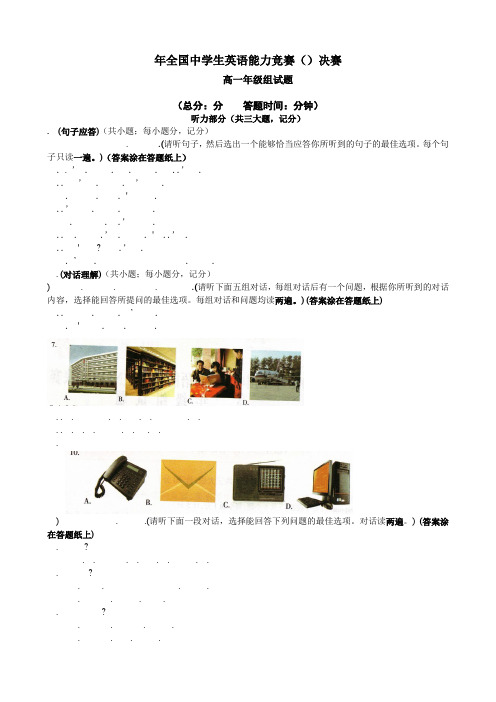
年全国中学生英语能力竞赛()决赛高一年级组试题(总分:分答题时间:分钟)听力部分(共三大题,记分). (句子应答)(共小题;每小题分,记分). .(请听句子,然后选出一个能够恰当应答你所听到的句子的最佳选项。
每个句子只读一遍。
)(答案涂在答题纸上).. ’......’...’..’....' ...’......’.....’..' ..’...' ? .’..’.... (对话理解)(共小题;每小题分,记分)) . . . .(请听下面五组对话,每组对话后有一个问题,根据你所听到的对话内容,选择能回答所提问的最佳选项。
每组对话和问题均读两遍。
) (答案涂在答题纸上)....’..' .... . . . . . . . .. . . . . . . . ..) . .(请听下面一段对话,选择能回答下列问题的最佳选项。
对话读两遍。
)(答案涂在答题纸上). ?. . . . . . . .. ?. . . .. . . .. ?. . . .. . . .. ?, . . . . . . .. ?. . . . . . . .. (短文理解)(共小题;每小题分,每小题分计分)) . .(请听下面一段材料,根据你所听到的内容,选择能回答所提问的最佳选项。
材料读两遍。
) (答案涂在答题纸上). ?. . . .. . . .. ?. , . . , . . , . . , .. ?. US. . UK. . US UK. . US UK.. ?. . . . . . . .. ' ?. . . . . . . .) , . .(请听下面一段材料,根据你所听到的材料内容填空,每空填一到两个单词。
材料读两遍。
) (答案涂在答题纸上)笔试部分(共七大题,计分). (选择填空)(共小题,每小题分,计分), , , , , . .(下列各句或对话均含有, 四个选项中,请从四个选项中选出可以完成该句或对话的最佳选项。
2019年全国中学生英语能力竞赛决赛高一组模拟题2
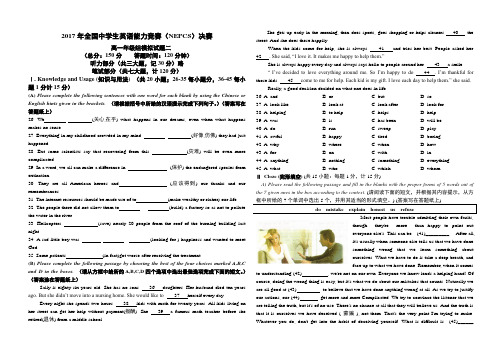
2017年全国中学生英语能力竞赛(NEPCS)决赛高一年级组模拟试题二(总分:150分答题时间:120分钟)听力部分(共三大题,记30分)略笔试部分(共七大题,计120分)Ⅰ. Knowledge and Usage (知识与用法) (共20小题;26-35每小题分,36-45每小题1分计15分)(A) Please complete the following sentences with one word for each blank by using the Chinese or English hints given in the brackets.(请根据括号中所给的汉语提示完成下列句子。
)(答案写在答题纸上)26. We (关心,在乎) what happens in our dreams, even when what happens makes no sense.27. Everything in my childhood crowded in my mind (好像,仿佛) they had just happened.28. But some scientists say that recovering from this (灾难) will be even more complicated.29. In a word, we all can make a difference in (保护) the endangered species from extinction.30. They are all American heroes and (应该得到) our thanks and our remembrances.31. The internet resources should be made use of to (make wealthy or richer) our life32. The people there did not allow them to (build) a factory so as not to pollute the water in the river.33. Helicopters (save) nearly 20 people from the roof of the burning building last night.34. A sad little boy was (looking for ) happiness and wanted to meet God.35. Some patients (in fact)got worse after receiving the treatment.(B) Please complete the following passage by choosing the best of the four choices marked A,B,C and D in the boxes. (请从方框中给所的A,B,C,D四个选项中选出最佳选项完成下面的短文。
2005年全国中学生英语能力竞赛(nepcs)初赛高一年级组试题[下学期] 人教版[全套] 人教版
![2005年全国中学生英语能力竞赛(nepcs)初赛高一年级组试题[下学期] 人教版[全套] 人教版](https://img.taocdn.com/s3/m/2323eefbf242336c1eb95e96.png)
2005年全国中学生英语能力竞赛(NEPCS)初赛高一年级组试题听力部分(共三大题,计30分)I. 句子理解(Sentences)(共10小题,计10分)请听句子,然后从A、B、C、D四个选项中选出一个与你所听到的句子意思一致或相近的答案。
每个句子只读一遍。
(答案涂在答题纸上)1. A. You mustn't bring mobile phones into this meeting room.B. Don't leave your mobile phones in this meeting room.C. Mobile phones cannot be used in this meeting room.D. You can use mobile phones in this meeting room.2. A. You'd better leave because the light isn't bright enough to work.B. You must check that the light is turned off when you leave.C. When you leave, the light should remain on.D. Please take the lamp with you when you leave.3. A. Emma seldom speaks no matter whether she's excited or not.B. Emma is so excited that she can't say a word.C. Emma won't say a word unless she's excited.D. Emma is too excited, and she talks a lot.5. A. Ellen always goes to school after a short walk.B. Ellen seldom goes out for a walk before going to school.C. Ellen likes to go to the school yard for a short walk.D. Ellen often goes out for a short walk after she gets to school.6. A. Jerry is fond of playing with his little brother.B. Jerry is very happy to meet his little brother by accident.C. Jerry loves to read funny stories for his little brother.D. Jerry is very happy to go without his little brother who always bothers him.7. A. I stood up because I saw your mother was coming.B. I wanted to talk with your mother face to face.C. I haven't gone to sleep, because I wanted to talk about your mother with you.D. I didn't want to talk with you about your mother at all.9. A. We should stay with our friends and our family and go nowhere.B. Our friends and our family will always stay far away from us.C. We should keep in touch with our friends and relatives wherever we go.D. We should enjoy our leisure to the full by making trips to other countries on holiday.10. A. I want to know whom Jane will invite to her birthday party.B. I wonder what the people whom Jane is going to invite to her birthday party do.C. Jane is going to invite nobody else but me to her birthday party.D. Jane is going to give notice to people that she will put off her birthday party to next Sunday.II. 对话理解(Dialogues)(共10小题,计10分)A)请听下面五组小对话,每组对话后有一个问题,然后根据你所听到的对话内容,选择能回答所提问题的最佳答案。
- 1、下载文档前请自行甄别文档内容的完整性,平台不提供额外的编辑、内容补充、找答案等附加服务。
- 2、"仅部分预览"的文档,不可在线预览部分如存在完整性等问题,可反馈申请退款(可完整预览的文档不适用该条件!)。
- 3、如文档侵犯您的权益,请联系客服反馈,我们会尽快为您处理(人工客服工作时间:9:00-18:30)。
2005年全国中学生英语实力竞赛(NEPCS)高一年级组样题全国中学生英语实力竞赛组委会办公室供应〔时间:120分钟总分:150分〕听力部分〔共三大题,计30分〕〔略〕笔试部分〔共七大题,计120分〕I. 选择填空〔Vocabulary and structure〕〔共20小题,计20分〕A〕从A、B、C、D四个选项中,选出可以填入空白处的最正确答案。
〔每题1分〕31. I'm thinking of hiring a teacher for my son. You see, he isn't able to _________ the rest of his class.A. get onB. keep up withC. keep in touch withD. go on32. —Must I come to your office to get my paper topic?—No, you _________. I can telephone you.A. mustn'tB. couldn'tC. shouldn'tD. don't have to33. _________ they will send us invitation is not yet known, but we hope they will.A. IfB. ThatC. WhetherD. When34. I agree with most of what you said, but I don't agree with _________.A. everythingB. anythingC. somethingD. nothing35. Peter asked Tom whether the teacher _________ five minutes _________.A. was here; agoB. has been there; beforeC. had been there; agoD. had been there; before36. It is _________ fun to go to _________ cinema.A. a; theB. a; 不填C. 不填; 不填D. 不填; the37. Mr. Brown returned to his office after a holiday, only _________ broken into.A. to find it had beenB. to find it hadC. finding it had beenD. finding it was38. Anyway, that evening, _________ I'll tell you more about later, I ended up staying at Rachel's place.A. whenB. whereC. whichD. what39. —Excuse me _________ for so long.—It doesn't matter.A. to keep you waitingB. for having kept you waitingC. for keeping you to waitD. of keeping you to wait40. —Bill, you don't look well. What's the matter?—Oh. _________. I'm just tired. I've been working until around ten every night this week.A. There's nothing seriousB. Something is wrong with meC. It's none of your businessD. That sounds great41. —Mr. Liu's wife was hurt in the traffic accident yesterday afternoon.—_________A. I don't think so.B. I'm interested in such news.C. She must be more careful.D. What a pity!Is she OK now?42. _________ of the land in that district _________ covered with trees and grass.A. Two fifth; isB. Two fifth; areC. Two fifths; isD. Two fifths; are43. Was _________ Bill, _________ played basketball very well, _________ helped you repair your bike?A. that; that; whoB. it; that; thatC. this; who; whoD. it; who; that44. When I returned to my childhood home, I was distressed to find all the apple trees _________.A. were cut downB. had been cut downC. to cut downD. being cut down45. If I had _________, I'd visit Europe, stopping at all the small interesting places.A. a long enough holidayB. an enough long holidayC. a holiday enough longD. a long holiday enoughB〕以下5题中的句子可以组成一篇小短文,请从所给的四个选项中选出可以填入空白处的最正确答案。
〔每题1分〕46. Most people have thirty-two _________ by the time they are twenty-five years old.A. neighboursB. petsC. teethD. friends47. It's easy enough to keep that many teeth clean, because people usually _________ time to brush them, most often two or three times a day.A. set asideB. set atC. set aboutD. set in48. Can you imagine, though, what it would be like to_________ about eight hundred times that many teeth?A. watchB. smellC. touchD. brush49. Some snails actually have as many as _________ thousand teeth!A. thirty-twoB. eighteenC. twenty-fiveD. forty50. It's just _________ that snails don't have to bother about brushing them.A. unfortunateB. luckyC. disappointingD. helplessII.阅读理解〔Reading comprehension〕〔共20小题,计35分〕A〕阅读以下短文,从A、B、C、D四个选项中,选出能答复所提问题或完成所给句子的最正确答案。
〔每题1分〕AThe first organized system that was used to send messages began in Egypt around 1500 B.C. This system developed because the pharaohs (法老王) frequently needed to send messages up and down the Nile River in order to keep their empire running smoothly. Later, the Persians (波斯人) developed a more efficient system for sending messages using men and horses. Message carriers rode along the road system stretching from one end of the Persian Empire to the other.The problem with early systems for sending messages was that only the government was allowed to send messages. Businesses and other people had to find their own ways for delivering messages to distant places. Later, with the fall of the Roman Empire, organized postal systems almost completely disappeared in Europe for 600 years. In China, however, Kublai Khan had built up his own system for delivering messages. This system worked in the same basic way as the Roman system. The difference was that Kublai Khan kept 300,000 horses along the roads of his delivery lines.It wasn't until the 1500s that a well-organized postal system appeared again in Europe. One family gained the right to deliver mail for the Holy Roman Empire and parts of Spain. This family continued to carry mail, both government and private, throughout Europe for almost 300 years. However, government-controlled postal systems finally took over private postal businesses, and by the 1700s government ownership of most postal systems in Europe was an accepted fact of life. These early government systems remained quite expensive for public use until 1840 when Roland Hill suggested lowering postal rates in order to encourage more people to use the system. Soon after that many other countries took up his idea.51. The Egyptian pharaohs sent many of their messages by _________.A. boatB. fireC. horsesD. runners52. _________ was (were) allowed to use the early Roman postal system.A. EveryoneB. Rich business ownersC. No oneD. The government53. What was different about the postal system used by Kublai Khan?A. It had more horses.B. The roads were smaller.C. The stations were further apart.D. It delivered mail to all of Asia.54. In the _________, government monopoly of postal systems became common.A. 1500sB. 1700sC. 1800sD. 1900s55. What did Roland Hill suggest which changed postal practices around the world?A. Make the post faster.B. Make the post bigger.C. Make the post cheaper.D. Make the post easier.B〕阅读以下短文,然后答复以下问题或完成句子。
